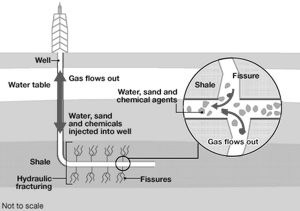What is Fracking in Politics
Fracking, short for hydraulic fracturing, is a controversial and significant political issue that relates to the extraction of natural gas and oil from underground rock formations. In the context of politics, fracking refers to the political debates and policies surrounding the drilling technique and its impact on the environment, economy, and energy production.
Key points related to fracking in politics include:
Energy Policy: Fracking has a direct impact on a country’s energy policy. It is often seen as a way to increase domestic energy production, reduce energy imports, and potentially lower energy prices. Therefore, it plays a role in discussions about national energy security and independence.
Environmental Concerns: Fracking is a contentious issue due to its potential environmental impact. Critics argue that it can lead to groundwater contamination, air pollution, habitat disruption, and even induced seismic activity (earthquakes). These concerns have sparked political debates about the regulation and oversight of fracking operations.
Economic Impact: Fracking can bring economic benefits to regions where it is practiced. It creates jobs in the energy sector and can stimulate economic growth. Political discussions often center on the trade-off between these economic benefits and potential environmental risks.
Regulation: Political decisions influence how fracking is regulated. Different countries and regions have varying levels of oversight and regulations governing fracking practices. The level of regulation is often a point of contention in political debates.
Climate Change: Fracking’s role in the overall energy mix and its potential to release methane, a potent greenhouse gas, into the atmosphere, are issues connected to the broader debate on climate change and environmental sustainability.
Energy Independence: Fracking is often framed as a way to reduce dependence on foreign sources of energy, which can have geopolitical implications. This aspect is especially relevant in discussions about national security and foreign policy.
Public Opinion: Public opinion on fracking varies widely. Some people view it as a valuable source of energy production, while others are deeply concerned about its environmental consequences. Politicians often respond to the views of their constituents when crafting their positions on fracking.
Legal and Regulatory Battles: Legal battles over fracking often occur at the state and local levels, where governments may enact bans or restrictions on fracking within their jurisdictions. These legal disputes can lead to political conflict and discussions about the balance between state and federal authority.
Don’t Forget to Check Out Our Website: universalbrowse
Overall, fracking in politics is a complex and multifaceted issue, with a range of stakeholders including energy companies, environmental groups, local communities, and government bodies. The political decisions made regarding fracking can have significant implications for energy production, the environment, public health, and the broader economy.
What Is Fracking?
Before delving into the politics of fracking, it’s essential to understand what this process entails. Fracking begins with drilling a well deep into the ground, often extending thousands of feet below the surface. Once the well is in place, a mixture of water, sand, and chemicals is injected at high pressure to create fractures in the rock. These fractures allow the release of natural gas or oil, which is then collected for various uses.
The History of Fracking
Fracking has a long history, dating back to the mid-20th century. Initially, it was a relatively small-scale operation. However, advancements in technology and growing energy demands have led to a substantial increase in fracking activities over the past few decades.
Fracking’s Economic Impact
Fracking has had a profound economic impact on the regions where it is practiced. It has led to job creation, economic growth, and increased energy production, making countries less dependent on foreign energy sources. Proponents argue that fracking has the potential to reduce energy costs and enhance national security.
Environmental Concerns
The environmental concerns surrounding fracking are one of the most debated topics in the field. Critics point to water contamination, air pollution, and the release of greenhouse gases as significant issues associated with fracking. The long-term environmental consequences remain a point of contention.
Health Implications
The potential health implications of fracking are another area of concern. Residents near fracking sites have reported health problems, including respiratory issues and skin conditions. However, more research is needed to establish a direct link between fracking and health problems.
Legal and Regulatory Framework
Fracking is subject to a web of regulations and legal frameworks. These laws vary from one region to another, with some areas banning or heavily regulating fracking, while others embrace it as a source of revenue and energy.
Political Controversies Surrounding Fracking
The politics of fracking are deeply polarized. On one hand, supporters argue that it boosts the economy and enhances energy security. On the other, opponents raise concerns about the environment, health, and the depletion of natural resources. This divide often falls along party lines, with Democrats and Republicans having differing stances.
Geopolitical Implications
Fracking can have significant geopolitical implications, as countries with vast reserves gain leverage in the global energy market. This dynamic can lead to shifts in international relations and alliances, further fueling the political debate.
The Fracking Ban Debate
The debate over whether to ban fracking has been a hot topic in recent years. Some politicians advocate for a complete ban, citing environmental and health concerns. Others argue for responsible fracking practices and economic considerations. Finding common ground in this debate is a challenging political task.
Alternatives to

To address the concerns associated with fracking, it’s essential to explore alternative energy sources and technologies. Renewable energy, such as solar and wind power, represents promising options for a sustainable energy future.
The Future of Fracking
As technology advances and political landscapes evolve, the future of fracking remains uncertain. Finding a balance between economic growth, environmental preservation, and health considerations will be a central challenge for policymakers.
Conclusion
In conclusion, fracking in politics is a complex and divisive issue, with economic, environmental, and health implications that cannot be ignored. As politicians grapple with this challenge, it is crucial to prioritize responsible practices and explore sustainable energy alternatives.
FAQs
Q. What is the primary goal of fracking in politics?
Fracking in politics primarily aims to address the energy needs of a nation while balancing economic, environmental, and health considerations.
Q. Why is fracking a controversial political issue?
Fracking is controversial due to its potential environmental and health impacts, as well as its economic benefits. The debate often falls along party lines.
Q. Are there safer alternatives to fracking?
Yes, safer alternatives to fracking include renewable energy sources like solar and wind power, which have a lower environmental footprint.
Q. What are the main geopolitical implications of fracking?
Fracking can lead to shifts in global energy markets and affect international relations as countries with abundant reserves gain influence.
Q. How can the future of fracking be shaped by political decisions?
The future of fracking will be influenced by the policies and regulations put in place to balance economic interests, environmental concerns, and health considerations.
